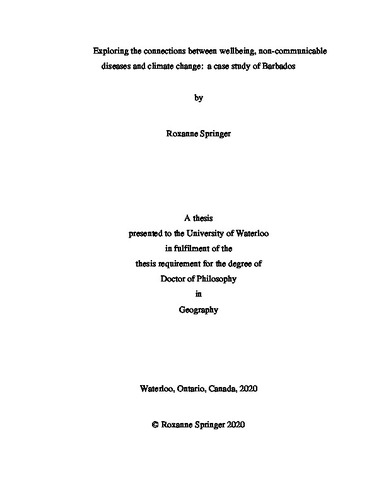| dc.description.abstract | Small island developing states (SIDS) in the Caribbean face the dual burden of climate change (manifested as increased temperatures, more intense/frequent extreme weather events, sea-level rise and higher sea surface temperatures), and chronic non-communicable diseases as the leading cause of morbidity and mortality (namely cardiovascular diseases, cancer, respiratory illnesses and diabetes) (PAHO, 2017). These two challenges jeopardise past development strides that have served to enhance the population wellbeing of these countries and hinder future developmental progress. Despite widespread awareness of the rise of NCDs and the growing threat of climate change, little research has explored wellbeing outcomes that will occur at the intersection of these challenges. Appropriate responses to climate change and the growing prevalence of NCDs are crucial for SIDS to safeguard the wellbeing of populations and ensure that these countries can meet their sustainable development goals (SDGs). However, to ensure interventions are effective, policy and decision-makers need to consider the contextual social, economic, political, and cultural factors, along with the environmental and climatic factors to which populations are exposed. It is within this context that this research investigates health and wellbeing effects of climate change in SIDS, using Barbados as an example. It takes the novel approach of investigating non-communicable diseases as a health outcome of priority that is affected by climate change. No research in Barbados or the Caribbean has explored the effects of climate change on NCDs, despite their heavy burden in the region.
A political ecology of health (PEH) approach is applied to this research to better understand how large-scale societal influences shape health and wellbeing in SIDS. Though the lens of PEH, this research draws focus to political, economic and social factors to explain how population wellbeing is affected by climate change. This was done through the following research objectives: 1) explore drivers and determinants of wellbeing among the population of Barbados, and how these components of wellbeing affect vulnerability to the impacts of climate change; 2) explore the knowledge and perceptions of health professionals across multiple scales on the current and future burden of non-communicable diseases in Barbados, and possible connections between climate change stressors and non-communicable diseases; and 3) investigate the policy responses to NCDs in Barbados to assess the potential for the alignment of NCD and climate change adaptation policy agendas.
Using guidelines from two vulnerability assessment frameworks, participatory vulnerability assessments described by Smit and Wandel (2006) and the health vulnerability assessment described by the World Health Organisation (2013a), this study explored health and wellbeing in Barbados, and assessed vulnerabilities to climate change. Qualitative data collected using in-depth interviews with lay citizens (n = 20), key-informant interviews with Barbadian health professionals (n = 10), and a document review of NCD and climate changes strategic plans, were used to address the research objectives.
The findings of this research indicate that wellbeing in Barbados is defined by socioeconomic, social and environmental factors, made complex by the interconnectedness of drivers of wellbeing. Lay citizens displayed little awareness and concern about the effects of climate change on their wellbeing and had rudimentary knowledge of the expected impacts of climate change in Barbados. Despite this, findings indicate that through various determinants of wellbeing, there are pathways that positively or negatively affect vulnerability to climate change. As it relates to non-communicable diseases and climate change, there is widespread concern among health professionals about the current and future prevalence of NCDs in Barbados, but less concern about the future burden of NCDs in the context of a changing climate, largely because of lack of knowledge among the majority of the health experts interviewed. Those knowledgeable about potential connections, noted the difficulty that climate change would pose to the prevention and management of NCDs, given the impacts of climate stressors on food security, the built environment, and physiological and psychosocial health impacts. To compound the risk that climate change poses to health in Barbados, findings show that there has been no planning for climate change within NCD policies on a national or regional scale. Health systems cannot effectively plan NCD interventions to reduce the burden of these diseases without considering future climate stressors. These findings have led to several recommendations for policy, practice and future research, such as suggestions for climate-sensitive wellbeing indicators and the urgent need for a climate change and health action plan in Barbados. | en |

